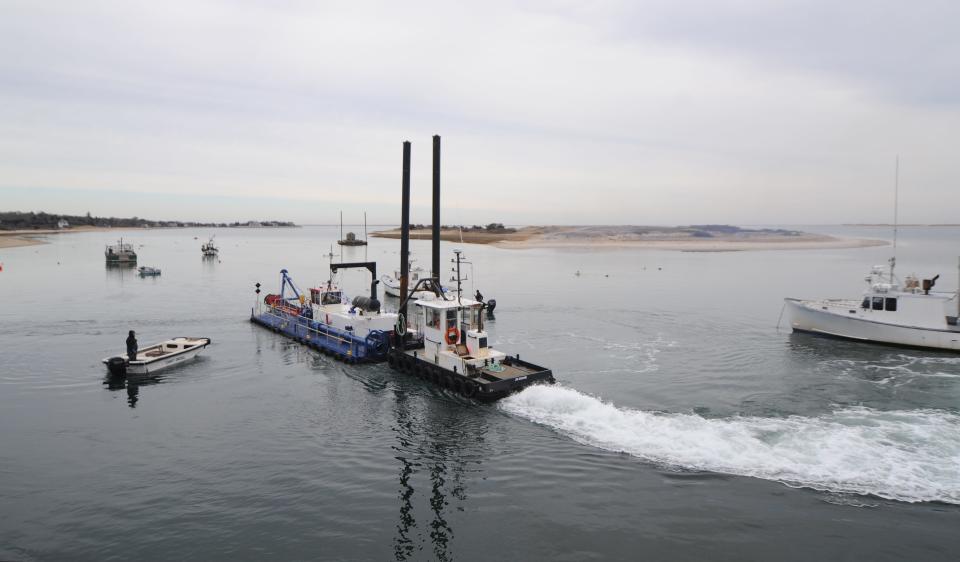Cape Cod doesn't need its county dredge program to make money. It just has to stop losing.
The Barnstable County dredge program, which has been providing dredging services to 14 of the Cape’s 15 towns since 1996, has been running at a deficit for several years.
Last week, the county Assembly of Delegates heard three potential options to bring the program out of the red.
“We have an efficient dredge program, but the biggest problem is finances and the permitting process,” Mark Forest, chairman of the Board of Regional Commissioners, said Dec. 20.
The county government contracted Anchor QEA, LLC, of Baltimore to review the existing program and develop models and dredge rate scenarios that aim for a revenue neutral program over five years from 2025 to 2029. A working group comprising a consultant, county staff and Anchor QEA representatives gathered information and drafted a five-year plan that was summarized for the Assembly of Delegates Dec. 20.

The report notes that the trend of the dredging program operating in the red for several years “will impact the ability of the county to continue providing dredging services to the towns.”
Leslie-Ann McGree of Full Sail Consulting from the working group stressed the expense of the program noting that revenue had covered expenses for only a few years and is not sustainable. She said the goal of the plan is not to make money, but to move to a sustainable program and “come out with a net revenue neutral program.”
Private dredge options are “exceedingly more expensive,” she said.
Subsidies no longer help pay for the county program
Forest said the state and federal governments previously provided subsidies for the dredging but do so no longer. It is difficult to endorse something for Select Boards and town managers, he said, but the ultimate rate decisions come back to the commission and the assembly.
“We can’t let this decision sit much longer,” he said.
Walt Dinicola of Anchor QEA presented the report, citing three dredge rate scenarios for a revenue neutral dredge program based on the county dredging approximately 100,000 cubic yards of material per year.
Scenario 1 would continue offering services to the towns at two flat rates per cubic yard, one for projects that don’t require a booster pump at $28.10 per cubic yard and one for projects that required a booster pump at $29.60 per cubic yard. That scenario would provide higher revenue to allow the program to replenish a retained earnings fund, which is currently depleted, in the first two years. It would also allow the program to pay back subsidies sooner and make funds available for major equipment repairs.
December 2023 Dredging Summit: 'A true asset' but cumbersome. Should it be easier for Cape towns to get dredging permits?
“The working group prefers it,” Dinicola said of Scenario 1.
Scenario 2 evaluated ways to ease the cost to towns by starting with a lower rate of $22.10 per cubic yard with no booster and increasing each year to $34.10 in 2029. The report states that scenario “could potentially result in continued program losses initially and delayed payback of subsidies and would result in the highest unit costs in the later years.”
Scenario 3 is similar to Scenario 1, Dinicola said, with rates held for five years, but includes a lump sum charge for costs associated with mobilization/demobilization (set up) activities in the last three years that would be applied directly to the towns.
Brewster is the one Cape town that does not use county dredging services
The report summarizes the existing costs associated with the dredge program and future costs to continue maintenance, operations and emergency funds. Costs include annual crew wages and benefits, county government support, equipment ownership, equipment operations, insurance, payback of debt and subsidies, surveying, leased building space and other miscellaneous costs.
When asked by a delegate about the program beyond 2029, McGee said the analyses haven’t gone beyond 2029. The rates beyond that would need to be reevaluated in a minimum of five years to address changes in operation costs. If the dredging program continues to operate in a deficit after three years, the report recommended the rate structures chosen be reviewed at the end of fiscal year 2027.
The report notes that Brewster is the only town that does not use the dredging services because it does not have any channels or a coastal harbor that requires it. Orleans, Sandwich and Wellfleet did not use the services the past four dredging seasons, but all have projects planned for the next five years.
The assembly did not take any action on the report Wednesday.
Thanks to our subscribers, who help make this coverage possible. If you are not a subscriber, please consider supporting quality local journalism with a Cape Cod Times subscription. Here are our subscription plans.
This article originally appeared on Cape Cod Times: Cape Cod's dredge program has lost money for years. What's the fix?

